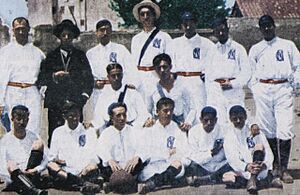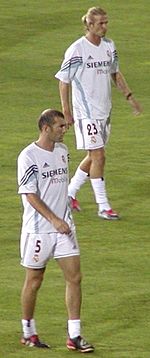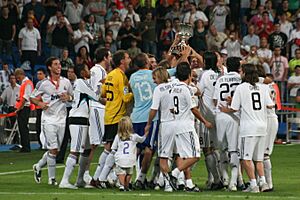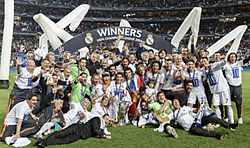History of Real Madrid CF facts for kids
Real Madrid Club de Fútbol is a famous football club from Madrid, Spain. It started in 1902 as Madrid Football Club. Their first official game was on May 13, 1902, where they lost to FC Barcelona.
From 1902 to 1940, Real Madrid played against other local teams in special tournaments. These games helped them qualify for the Copa del Rey, a big national cup. In 1929, the club became one of the first teams in La Liga, Spain's main national league. Even today, Real Madrid is one of only three clubs that have never been moved down from the top Spanish league. The other two are Athletic Bilbao and Barcelona.
Between 1902 and 1929, Real Madrid won the Copa del Rey five times. They also won the regional championship 15 times. Real Madrid started strong in La Liga, finishing second in its first season. They won the league for the first time in 1932. The 1950s were a great time for the club. They won La Liga four times and the European Cup five times. The 1960s were even better for national titles, with Real Madrid winning eight league championships. They won their first "double" (league and national cup) in 1962. Real Madrid is also the only Spanish team to win five league titles in a row, which they did twice (1960–65 and 1985–90).
Real Madrid is also known for its amazing success in the European Cup. They have won this top European trophy a record fifteen times! Legendary players like Alfredo Di Stéfano and Ferenc Puskás helped the club win the European Cup five times in a row from 1956 to 1960. This included a memorable 7–3 win against Eintracht Frankfurt in the 1960 final. The club won the trophy for a sixth time in 1966. This team was called the Ye-Ye team and was made up entirely of Spanish players. They beat Partizan 2–1 in the final.
Because they won the competition five times in a row, Real Madrid was allowed to keep the original trophy. They also earned the right to wear a special badge since 2000. Real Madrid has also won the UEFA Cup twice.
In 1996, Lorenzo Sanz, the club president, hired Fabio Capello as coach. Even though Capello stayed for only one season, Real Madrid won the league. Important players like Roberto Carlos, Predrag Mijatović, and Clarence Seedorf joined the team. These new players joined stars like Raúl and Fernando Hierro. In 1998, with new player Fernando Morientes, Real Madrid finally won their seventh European Cup. This was after a 32-year wait! They beat Juventus 1–0 in the final, with a goal from Mijatović.
Real Madrid continued to win the Champions League in 2000, 2002, and 2014. They also won in 2016, 2017, 2018, 2022, and 2024. Madrid has also won the Intercontinental Cup/FIFA Club World Cup eight times.
Contents
Early Years of Real Madrid
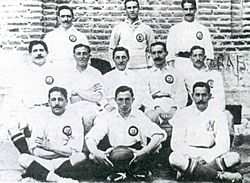
Football came to Madrid thanks to students and teachers. They started a club called Sky Football in 1897. In 1900, some members left to create a new club, Nueva Sociedad de Foot-ball. Julián Palacios led these members and is seen as the first Real Madrid president.
In October 1901, Nueva Sociedad de Foot-ball changed its name to Madrid Football Club. On March 6, 1902, Madrid Football Club was officially founded. The Padrós brothers, Juan and Carlos, gathered football fans. They wanted football to be a sport for everyone. They chose white shirts to honor a famous English team, Corinthian. The club had 28 founding members.
The club played its first game on March 9, 1902. It was between two teams of Madrid FC players. On May 2, 1902, Madrid FC played its first friendly match against another club, New Foot-Ball Club. It ended in a 1–1 draw.
Carlos Padrós helped organize the 1902 Copa de la Coronación to celebrate the crowning of King Alfonso XIII. He convinced the mayor of Madrid to offer a silver cup as the prize. Madrid FC played its first competitive match in this cup on May 13. They lost 3–1 to FC Barcelona. This was also the first "El Clásico" game between the two rivals. Madrid got its first competitive win on May 16, beating Club Español de Football (now RCD Espanyol) 3–2.
In August 1902, Madrid played a match against Moncloa at El Escorial. Madrid won 6–5 and received two ceramic plates, their first trophies. In December 1902, Carlos Padrós helped create the Madrid Association of Foot-ball Clubs. This group managed football in Madrid.
In 1903, Madrid lost 3–2 in the Copa del Rey final to Athletic Bilbao. This was the first "El Viejo Clásico" game. The club faced problems in the 1903–04 season. Many players left to form new clubs. Madrid then merged with Moderno Football Club in January 1904. The club was briefly called Madrid–Moderno. Madrid was also a founding member of FIFA on May 21, 1904.
Madrid won its first official title in 1905, beating Athletic Bilbao 1–0 in the Copa del Rey final. They then won four Copa del Rey titles in a row (1905, 1906, 1907, 1908). They were the first team to do this. Madrid also won four regional championships in a row. In 1905, Madrid played its first international match against a French team.
In 1910, Arthur Johnson became Real Madrid's first manager. In 1912, Madrid moved to its first permanent home ground, Campo de O'Donnell. This stadium opened on October 31, 1912.
Madrid won its 5th Copa del Rey trophy in 1917. On June 29, 1920, King Alfonso XIII gave the club the title of "real" (royal). So, the club's name changed to Real Madrid Football Club. They also added the royal crown to their badge.
In 1920, Real Madrid went on its first foreign tour to Italy. In 1923, the club moved to a new stadium, Campo de Ciudad Lineal. This was their first grass field. In 1924, the Estadio Chamartín was built and became Madrid's home until 1947.
Starting La Liga
Real Madrid was part of the first national football league in Spain, La Liga, which started in 1929. In the first season, Real Madrid led for a long time but finished second, just one point behind Barcelona. They reached the Copa del Rey finals in 1929 and 1930 but lost both times.
In 1930, Real Madrid bought goalkeeper Ricardo Zamora for a large sum. On April 14, 1931, Spain became a republic. The club lost the "Real" title and the royal crown from its emblem. It went back to being called Madrid Football Club.
Madrid won its first La Liga title in the 1931–32 season, without losing a single game! They won the title again the next year. They won their 6th national cup in 1934 and their 7th in 1936, beating Barcelona.
No football games were played in Spain for three seasons (1936–1939) because of the Spanish Civil War. On January 1, 1941, Madrid Football Club changed its name back to Real Madrid Club de Fútbol and got its royal crown back.
On June 13, 1943, Madrid beat Barcelona 11–1 in a controversial cup semi-final. This is still the biggest win in "El Clásico" history. Some say this game made people see Madrid as the team of the government at the time.
The Bernabéu Era (1943–1978)
Santiago Bernabéu became president in 1943. He had been a player, captain, and manager for the club for almost 70 years. He rebuilt the club after the Civil War. He also oversaw the building of the Santiago Bernabéu Stadium and the training ground, Ciudad Deportiva.
Bernabéu made the club work like modern professional teams. He also started signing world-class players from Spain and other countries. The most famous was Alfredo di Stéfano from Argentina. Many Real Madrid legends played during his time, including Di Stéfano, Ferenc Puskás, and Francisco Gento.
Under Bernabéu, Real Madrid became a major power in Spain and Europe. Before he passed away in 1978, he had been president for almost 35 years. During his time, the club won 1 Intercontinental Cup, 6 European Cups, 16 league titles, and 6 Spanish Cups.
The De Carlos Era (1978–1985)
After Santiago Bernabéu, Luis de Carlos became president in 1978. On June 4, 1980, the Santiago Bernabéu Stadium hosted the Copa del Rey final. Real Madrid played against their own second team, Real Madrid Castilla. Real Madrid won 6–1.
In 1980, France Football magazine named Real Madrid the "Best European Team." They won La Liga and the Copa del Rey that year.
The 1980–81 season ended sadly for Madrid. They lost the league title on the last day to Real Sociedad. A month later, in the 1981 European Cup Final, Liverpool beat Madrid 1–0 to win the European Cup.
The final of the 1982 FIFA World Cup was held at the Santiago Bernabéu. Italy beat West Germany 3–1.
In 1982, Luis de Carlos brought back Alfredo Di Stéfano as coach. His first season was tough, as the team lost five trophies, including four finals. They also finished second in La Liga by just one point. Di Stéfano left in 1984.
On December 12, 1984, Emilio Butragueño became famous. He scored three goals against Anderlecht in the UEFA Cup. Real Madrid won 6–1 and moved to the next round.
Real Madrid won their first two UEFA Cup titles in a row. They won in 1985 and again in 1986.
The Mendoza Era (1985–1995)
Ramón Mendoza became president in 1985, starting a new period for the club.
The Vulture's Cohort
"La Quinta del Buitre" (The Vulture's Cohort) was a nickname for five young Real Madrid players. They came from the club's youth academy and led the team in the 1980s. The name came from Emilio Butragueño's nickname, "El Buitre" (The Vulture). The other four players were Manolo Sanchís, Martín Vázquez, Míchel, and Miguel Pardeza.
Sanchís and Martín Vázquez played their first game for the main team in December 1983. Butragueño debuted a few months later in February 1984 and scored twice. Pardeza and Míchel soon joined them.
With "La Quinta del Buitre," Real Madrid became one of the best teams in Spain and Europe. They won two UEFA Cups and five Spanish championships in a row. Their only regret was not winning the European Cup.
Sanchís was the only one of "La Quinta" to play his whole career at Madrid. He finally won the Champions League twice (1998 and 2000), achieving what the group couldn't in their prime. He retired in 2001.
The Sanz Era (1995–2000)
Lorenzo Sanz became president in November 1995. In May 1996, he brought in Fabio Capello as the new coach. Capello had won many titles with Milan. He helped Real Madrid win the league, but he left after just one season.
The German coach Jupp Heynckes replaced Capello. He led the team to win the long-awaited Champions League title in 1998. This was the club's first European Cup since 1966. In the final in Amsterdam, Real Madrid beat Juventus 1–0 with a goal from Pedja Mijatović.
Despite winning in Europe, Heynckes was fired. After a few more coaching changes, Vicente del Bosque became manager. Under him, Real Madrid won their eighth European Cup/Champions League title. In the final in Paris, Madrid beat Valencia 3–0. Goals came from Fernando Morientes, Steve McManaman, and Raúl.
The Galactico/Pérez Era (2000–2006)
Building the Galácticos
In July 2000, Florentino Pérez was elected club president. He promised to fix the club's money problems and update its facilities. His main promise was to sign Luís Figo, a star player from Barcelona. Pérez won the election, and Figo joined Madrid eight days later.
Pérez then signed other world-class players like Zinedine Zidane in 2001, Ronaldo in 2002, and David Beckham in 2003. The media started calling this team "Los Galácticos" (The Superstars). The idea was to mix global stars with young players from the club's academy.
This strategy helped the club earn a lot of money around the world. On the field, they won the UEFA Champions League and an Intercontinental Cup in 2002. They also won La Liga in 2003. However, after 2003, the team didn't win a major trophy for three seasons.
Challenges and Changes
After winning the league in 2003, there were some changes. President Pérez fired coach Vicente del Bosque. Club legend Fernando Hierro also left. New galáctico David Beckham joined. However, the club sold Claude Makélélé, a key defensive player, to Chelsea. Striker Fernando Morientes also left on loan.
Real Madrid, with new coach Carlos Queiroz, started the league slowly. They later showed strong form, leading the league by eight points in February. But then, they had a very bad run. They lost five of their last league games at home. They also lost the Copa del Rey final to Real Zaragoza. They finished a disappointing fourth in the league. Queiroz was fired and replaced by José Antonio Camacho.
Camacho wanted to improve the team's defense. Real Madrid bought defenders Walter Samuel and Jonathan Woodgate. However, they sold striker Samuel Eto'o to rivals Barcelona, where he became very successful. Camacho resigned due to poor results. Mariano García Remón and then Vanderlei Luxemburgo took over as coaches. Madrid finished second in the league in 2005, behind Barcelona.
The 2005–06 season started with new signings like Robinho and Sergio Ramos. But the team's poor form continued, including a 0–3 loss to Barcelona at home. Luxemburgo resigned. Real Madrid was knocked out of the Copa del Rey and the Champions League. On February 27, 2006, Florentino Pérez resigned as president.
The Calderón Era (2006–2009)
On July 2, 2006, Ramón Calderón became president. He hired Fabio Capello as the new coach. Capello signed players like Fabio Cannavaro and Ruud van Nistelrooy. During the January transfer window, Madrid signed young talents like Marcelo, Gonzalo Higuaín, and Fernando Gago.
In January 2007, David Beckham agreed to join LA Galaxy at the end of the season. Coach Capello initially said he wouldn't play Beckham again, but later changed his mind. Beckham returned and scored important goals.
On March 7, 2007, Real Madrid was knocked out of the Champions League by Bayern Munich. Bayern scored the fastest goal in Champions League history in that match.
On March 10, Real Madrid played Barcelona in "El Clásico." Real Madrid led three times, but Lionel Messi scored a hat-trick, and the game ended 3–3.
Real Madrid found its form late in the season, winning many games. On May 12, they beat Espanyol 4–3, coming back from 1–3 down. This put them in first place in La Liga for the first time all season. They won the league title on June 17, 2007, beating Mallorca 3–1. This was their 30th Spanish league title and their first major trophy since 2003.
More Seasons
Real Madrid started the 2007–08 season well under new manager Bernd Schuster. They won their first three league games. They also did well in the Champions League group stage. However, they lost in the first knockout round to Roma.
On December 9, 2008, Bernd Schuster was fired. Juande Ramos replaced him. The season was very bad for the club. Real Madrid was knocked out of the Champions League by Liverpool. They also lost to a lower-division team in the Copa del Rey. Most famously, Barcelona beat them 6–2 at the Santiago Bernabéu, which helped Barcelona win the league. Madrid ended the season losing their last four league games.
Second Florentino Pérez Era (2009–present)
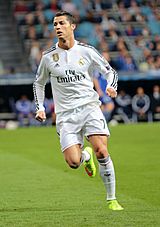
On June 1, 2009, Florentino Pérez became Real Madrid president again. He continued his "Galácticos" policy. He bought Kaká for a record £56 million. Then, he broke that record by buying Cristiano Ronaldo for £80 million.
The 2009–10 season was a transition year. Madrid finished second in the league with 96 points, a club record at the time. They were knocked out of the Champions League by Lyon. Ronaldo scored 33 goals, and Madrid scored 102 goals in La Liga.
José Mourinho became manager in May 2010. In the 2010–11 season, Madrid competed strongly with a very strong Barcelona team. Madrid finished second in La Liga. They beat Barcelona in the Copa del Rey final, winning their first trophy of the second "Galáctico" era. They lost to Barcelona in the Champions League semi-finals. Ronaldo scored 40 goals and won the European Golden Shoe.
In the 2011–12 season, Real Madrid won La Liga for a record 32nd time. They set many league records, including 100 points and 121 goals. They reached the Champions League semi-finals but lost to Bayern Munich on penalties. Ronaldo became the fastest player to score 100 goals in the Spanish league.
Real Madrid started the 2012–13 season by winning the Supercopa de España against Barcelona. This was their only trophy that season. They finished second in La Liga and reached the Champions League semi-finals again, losing to Borussia Dortmund. They also reached the Copa del Rey final but lost to Atlético Madrid. After this, José Mourinho left the club.
La Décima and Champions League Three-peat
On June 25, 2013, Carlo Ancelotti became Real Madrid's new manager. Zinedine Zidane was one of his assistants. On September 1, 2013, Gareth Bale joined from Tottenham Hotspur for a reported €100 million, a new world record at the time.
In Ancelotti's first season, Real Madrid competed for all three major trophies. They won the Copa del Rey in April, beating Barcelona with a winning goal from Bale. The big moment came in the Champions League. Real reached the final after 12 years. They beat rivals Atlético Madrid 4–1 after extra time to win their tenth European Cup. This achievement is known as "La Décima" (The Tenth).
After winning "La Décima," Real Madrid signed Toni Kroos and James Rodríguez. In August, they won the 2014 UEFA Super Cup. However, they sold key players Xabi Alonso and Ángel Di María.
Real Madrid had a slow start to the 2014–15 season but then went on a record-breaking 22-match winning streak. This included wins against Barcelona and Liverpool. In December, they won their first Club World Cup. The winning streak ended in January 2015. Madrid fought for the La Liga title and Champions League but finished second in the league and lost in the Champions League semi-finals. Ronaldo scored 48 league goals and 61 goals overall. Carlo Ancelotti was fired in May 2015.
On June 3, 2015, Rafael Benítez became the new manager. Real Madrid was unbeaten in the league until November. They lost 0–4 at home to Barcelona. In the Copa del Rey, Real accidentally played a suspended player and were disqualified. Benítez was fired on January 4, 2016.
Zinedine Zidane was then promoted to head coach. Under Zidane, Madrid improved greatly. They won the Champions League on May 28, beating rivals Atlético Madrid on penalties after a 1–1 draw. This was their eleventh Champions League title, known as "La Undécima" (The Eleventh).
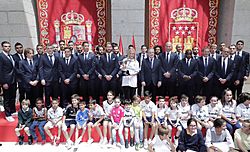
Real Madrid started the 2016–17 season (Zidane's first full season) by winning the 2016 UEFA Super Cup. On December 10, 2016, Madrid played their 35th game without a loss, a new club record. They won the 2016 FIFA Club World Cup in December. Their unbeaten streak reached 40 matches, breaking Barcelona's Spanish record.
In May, Madrid won the league title for a record 33rd time, their first in five years. On June 3, 2017, the club beat Juventus in the Champions League final. This made Real Madrid the first team to win the Champions League two years in a row. It was their 12th title, known as "La Duodécima" (The Twelfth). The 2016–17 season was Real Madrid's best ever in terms of trophies won (four out of five).
Real Madrid started the 2017–18 season by winning their second straight UEFA Super Cup and the 2017 Supercopa de España against Barcelona. In December 2017, Real won the 2017 FIFA Club World Cup, becoming the first team to win it two years in a row.
The team's league season was disappointing, finishing third. However, they did very well in the Champions League. They reached the final again and beat Liverpool 3–1. This made them the first club to win three straight Champions League titles. It was their 13th title. On May 31, Zidane announced he was leaving as manager.
Zidane's and Ronaldo's departures ended the "Second Galáctico Era." This period brought four Champions League titles, two La Liga titles, and many other trophies.
After Ronaldo's Departure
On June 12, Julen Lopetegui became the new manager. Real Madrid sold Cristiano Ronaldo to Juventus for €117 million. Madrid started the 2018–19 season by losing the 2018 UEFA Super Cup to Atlético Madrid. After a bad 1–5 loss to Barcelona in "El Clásico" in October, Lopetegui was fired.
Santiago Solari took over as coach. In December 2018, Real Madrid won the 2018 FIFA Club World Cup, their fourth title. They also became the first team to win it three times in a row. Solari's team started well in the league. But then, they were knocked out of the Copa del Rey by Barcelona. A few days later, they lost to Barcelona again in the league. On March 5, 2019, Ajax beat Real Madrid 4–1 at home, knocking them out of the Champions League.
On March 11, 2019, Real Madrid fired Solari and brought back Zidane as head coach. Madrid finished third in the league. The club won only one trophy in one of its worst seasons in modern history.
The 2019–20 season looked promising. Madrid spent over €350 million on new players like Eden Hazard and Luka Jović. On January 12, 2020, Madrid beat Atlético Madrid in a penalty shootout to win the Spanish Supercup.
After a break due to the COVID-19 pandemic, La Liga restarted in June. Madrid won ten games in a row to win their 34th league title. They were knocked out of the Champions League by Manchester City. Real Madrid temporarily played home games at the Alfredo Di Stéfano Stadium while the Santiago Bernabéu was being renovated.
More Domestic Success and La Decimocuarta
Zidane left for a second time in May 2021. Carlo Ancelotti returned to coach the team for the 2021–22 season. He led them to win La Liga and the Supercopa de España. Ancelotti has now won all six major trophies available at Madrid.
In the Champions League, Madrid had an amazing run. They beat strong teams like Paris Saint-Germain, Chelsea, and Manchester City. In the final, they faced Liverpool, who were considered favorites. A single goal from Vinícius secured Real Madrid's 14th European Cup, their fifth in nine years. This achievement is known as "La Decimocuarta" (The Fourteenth).
In 2023, Real Madrid won its 20th Copa del Rey. They beat Barcelona 4–0 in the semi-finals and Osasuna 2–1 in the final.
In July 2023, Karim Benzema and Marco Asensio left the club. Real Madrid signed Jude Bellingham from Borussia Dortmund. Bellingham scored 19 goals in his first La Liga season and won awards for his great performance. They also signed Arda Güler.
Real Madrid's first title in 2024 was the Spanish Supercup. They beat Atlético Madrid and then Barcelona in the final.
They won their 36th league title, staying ahead of Girona. Real Madrid lost only one league game all season. They also became the first Spanish team to qualify for the 2024–25 UEFA Champions League.
In the Champions League, Real Madrid won their group. They beat RB Leipzig in the round of 16. In the quarter-finals, they faced Manchester City. After a 3–3 draw and a 1–1 draw, Real Madrid won 4–3 on penalties. They then beat Bayern Munich in the semi-finals, coming back in the last minutes. They qualified for the final against Borussia Dortmund at Wembley Stadium.
La Decimoquinta
The final match started at 8:00 PM UTC+0 in Wembley, England. In the first half, Borussia Dortmund had good chances but missed. In the 73rd minute, Real Madrid got a corner kick. Toni Kroos took it, and Carvajal scored with a header, making it 1–0. Two minutes later, Dortmund made a mistake. Bellingham took advantage, passed to Vinicius, who scored to make it 2–0.
With this score, Real Madrid became champions for the 15th time! Luka Modrić, Dani Carvajal, Nacho, and Toni Kroos became the top winners of the Champions League, matching Paco Gento's record. This was Toni Kroos' last game with Real Madrid, as he announced his retirement after Euro 2024.
See also
 In Spanish: Historia del Real Madrid Club de Fútbol para niños
In Spanish: Historia del Real Madrid Club de Fútbol para niños


